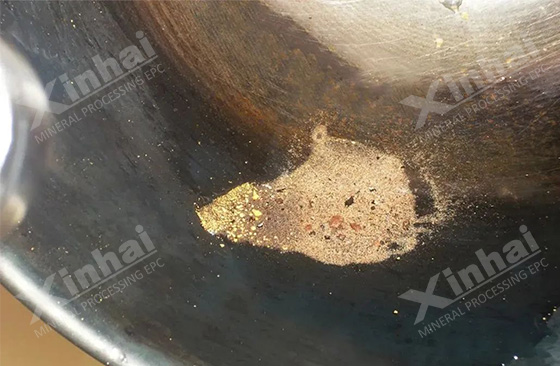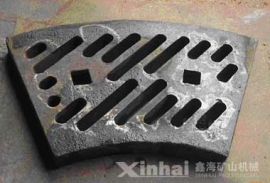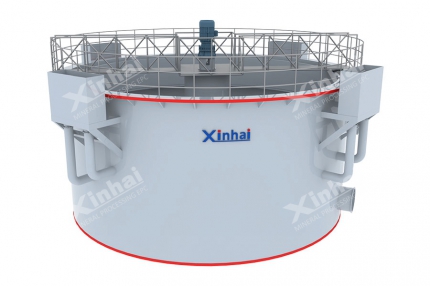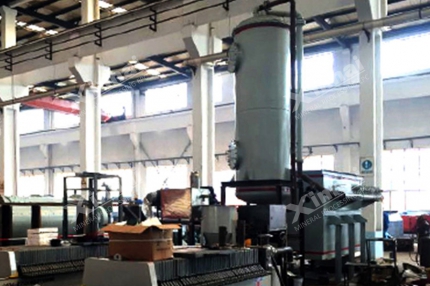A secondary enriched gold deposit formed by epigenesis of the primary gold-containing sulfide deposit of a certain gold ore. The secondary enrichment of gold deposits is directly related to the intensity of metal sulfide mineralization, oxidation characteristics and the development degree of oxidation zones. This article will analyze the mineral processing process of this gold ore.
Use the table of contents below to navigate through the guide:
01Gold ore type
In the oxidation zone, while the copper industrial ore body was relatively completely destroyed, the associated gold in the ore formed secondary enriched gold deposits, thus showing the ore deposit zoning of "upper gold and lower copper". The natural types of ores are divided into granite type, crypto-explosive clastic rock type, structural rock type and dacite porphyry type. These four types of ore account for 31%, 22%, 31% and 16% of the total ore respectively. The industrial type is an oxidized secondary gold ore, which is a low-grade and poor ore. Its main mineral combination is quartz-limonite-natural gold combination, followed by quartz-limonite and goethite-natural gold combination.

02Mineral characteristics of gold ore
The mineral composition of gold ore is relatively simple. The content of gangue minerals is generally greater than 93%, mainly quartz (the content is generally less than 90%), followed by dikaiite and other clay minerals (accounting for about 3%), and occasionally alunite and silk. Mica etc. The metal mineral content is generally 3% to 5%, mainly limonite, goethite, trace amounts of jarosite, and a small amount of oxidation residual sulfides (pyrite, chalcocite, covellite, etc.). There is a certain amount of natural gold present in the ore.
A large amount of gold in the ore occurs as visible natural gold, some in submicroscopic form, mainly in limonite. Fissure gold accounts for 77%, interstitial gold accounts for 15%, and wrapped gold accounts for 8%. The shape of natural gold is mainly granular, and some are flake, dendritic and irregular. The particle size of natural gold is mainly medium and coarse. The contents of the associated useful components lead, zinc, copper, sulfur, molybdenum, and mercury in the gold ore body are very small and cannot meet the comprehensive utilization indicators. The silver content is relatively uniform and low, and the harmful element arsenic is lower than the allowable indicator.

03Design and determination of gold ore processing process
According to the oxidation degree, occurrence state and embedded characteristics of the ore, the gold mine is obviously not suitable for flotation. The particle size is mainly medium and coarse, and it seems that re-selection can be considered. However, there are many gravity separation steps, low efficiency, and it is difficult to obtain the final product. In view of the large construction scale of this mine, and the test results show that the leaching rate of medium and coarse particles is very high, there is no need to adopt gravity separation. Based on the analysis of the ore properties and characteristics of the gold mine, the following options have been conceived:
Option 1: Conventional crushing and full heap leaching. The ore mined from opencast mining is crushed to -25mm and then all heap leached.
Option 2: Crushing and washing, the washed fine-grained ore (sludge) is carbon leached; coarse-grained ore is heap leached.
Option 3:The ore is crushed to -25mm for screening, and the fine-grained ore (about 20%) around -2mm is ground and leached with carbon; the coarse-grained ore (about 2-25mm) (about 80%) is heap-leached.
Option 4:The ore is crushed in one stage and then goes to autogenous grinding. The ore will be discharged by self-grinding for screening. About 50% of the ore below the screen will go to carbon leaching, and 50% of the ore above the screen will go to heap leaching.

04Carbon leaching gold extraction process in gold mine plant
According to the oxidation degree, occurrence state and embedded characteristics of the ore, this gold mine is obviously not suitable for flotation. The particle size is mainly medium and coarse, and it seems that re-selection can be considered. However, there are many gravity separation steps, low efficiency, and it is difficult to obtain the final product. In view of the large construction scale of this mine, and the test results show that the leaching rate of medium and coarse particles is very high, there is no need to adopt gravity separation.
In the fourth option, all the ores need to be crushed and self-grinded, and about half of the ores need to be carbon leached in the ball mill. The investment cost will be quite high. The investment cost of the third option is also very high. Although the investment cost of the first option is low, its final The gold recovery rate is not high, so after many considerations, the gold selection process of Plan 2 was finally adopted.
In the crushing and washing-carbon leaching-heap leaching process of Plan 2, the raw ore is coarsely crushed and then washed and then subjected to carbon leaching and heap leaching. For the coarse-grained ore that enters heap leaching, the screening and washing process removes most of the slime. , which is conducive to improving the leaching rate. For the fine particle size, since it is the product of screening and washing, the cost of the previous operations is not high. Adding a stage of grinding here (equivalent to regrinding) can achieve a fineness of -74μm85%. , the process for processing this part of ore has lower investment and cost than the conventional carbon slurry process. In addition, this part of the mud has a higher grade and can meet the requirements of carbon leaching, and a higher recovery rate can be obtained through carbon leaching.

The above is the customization of the beneficiation process plan for a gold ore concentrator. In the actual concentrator, because the properties of each gold mine are different, the gold beneficiation process is also different. It needs to be analyzed first and then designed. A suitable gold ore beneficiation process plan can achieve the ideal gold ore recovery rate.
Xinhai Mining can provide projects, whether it is gold ore beneficiation process design, gold ore beneficiation testing, gold ore beneficiation equipment, etc. Welcome to consult if you have any needs.


 marketing@ytxinhai.com
marketing@ytxinhai.com  0086 13810327080
0086 13810327080 






































































































 CHAT
CHAT MESSAGE
MESSAGE






